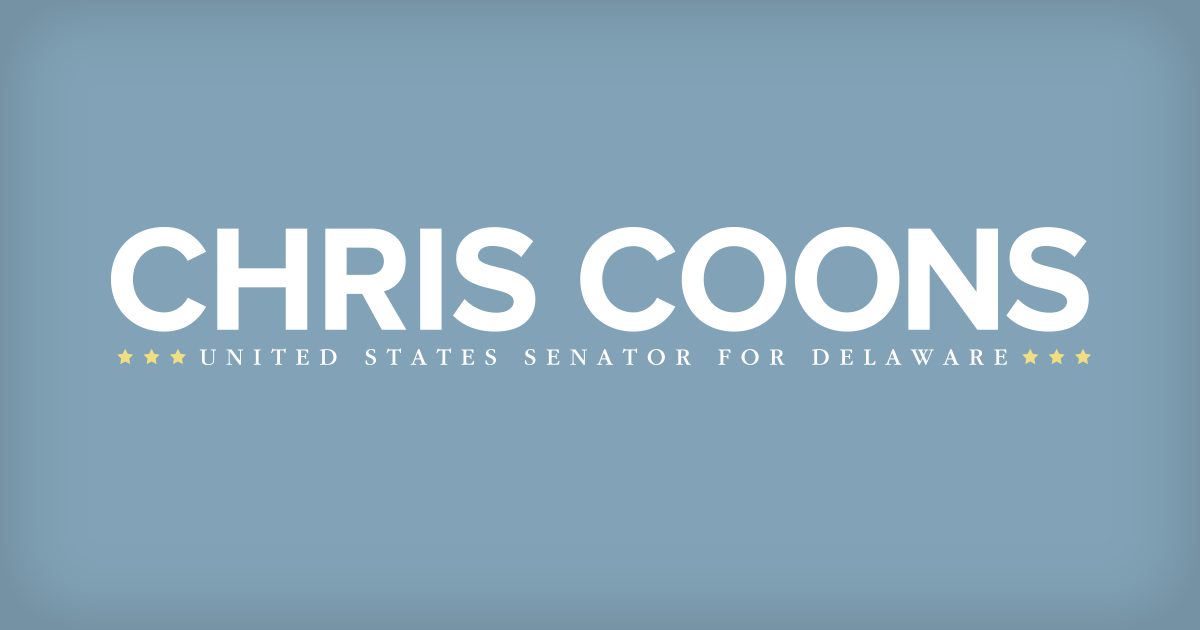Source: United States Senator for Delaware Christopher Coons
WASHINGTON — Today, the Senate Committee on Energy and Natural Resources voted to advance the full text of the Storing CO2 And Lowering Emissions (SCALE) Act as part of a larger energy infrastructure package. The landmark bill was first introduced by U.S. Senators Chris Coons (D-Del.) and Bill Cassidy, M.D. (R-La.) and U.S. Representatives Marc Veasey (D-Texas) and David McKinley (R-W.Va.) in March to drive deployment of carbon capture, utilization, and storage (CCUS) technology and the vital accompanying infrastructure in the United States. Underinvestment in CCUS has left the country behind in the adoption of a crucial tool in the fight against climate change, and this bill represents the largest government investment in CCUS infrastructure in U.S. history.
If passed and signed into law, the SCALE Act will help develop CCUS infrastructure as a critical means of reducing emissions of CO2 – or carbon dioxide, a greenhouse gas – while creating regional economic opportunities and thousands of jobs.
“As the author of the SCALE Act, I am thrilled to see continued bipartisan backing to build this crucial infrastructure that will connect the full carbon capture value chain, help reduce emissions, and create thousands of high-wage jobs,” said Senator Coons. “Carbon capture, utilization, and storage will play a critical role in meeting mid-century climate goals, supporting high-paying manufacturing jobs, and maintaining American competitiveness. I’m glad the Senate took an important bipartisan step in this direction, and I look forward to advancing the bill into law.”
“If the world wants less carbon in the atmosphere while preserving jobs, the answer is sequestering carbon. Passing this bill in committee supports that vision,” said Dr. Cassidy. “There is no better place in the world than our state to sequester carbon. This bill creates jobs, lowers emissions and is a win for Louisiana.”
“Carbon capture, utilization, and sequestration (CCUS) is one of the most critical technologies we can invest in to combat climate change globally while ensuring we are utilizing the full potential of our vast energy resources. As we transition to a cleaner energy future, increased investment in CCUS and carbon removal technologies will keep our energy affordable and reliable while reducing emissions and ensuring our continued climate leadership. The SCALE Act does just that by complementing and building on the nearly $6 billion for CCUS research, development, deployment, and commercialization I secured in the Energy Act of 2020. It will advance the build-out of much needed CO2 infrastructure and support thousands of clean energy and manufacturing jobs across the country, including in traditional energy producing communities like those in West Virginia. I look forward to working with my colleagues on both sides of the aisle to advance this legislation into law,” said Senator Joe Manchin (D-W.Va.), Chairman of the Senate Committee on Energy and Natural Resources.
How the SCALE Act supports carbon capture: Interconnected CO2 transport systems that collect CO2 from capture sources and deliver it to shared CO2 storage sites are the key backbone infrastructure needed for widespread carbon capture deployment at the necessary scale to achieve economy-wide emissions reductions. Yet, deployment of CO2 infrastructure faces critical cost barriers that require federal support to overcome. Many countries and regions, including the European Union, the UK, Norway, Australia, and Canada, have already committed billions to construct CO2 transport and storage infrastructure to decarbonize heavy industry, and the United States is currently lagging behind. The SCALE Act would provide the federal support needed to kick-start a CO2 transport and storage infrastructure build-out over the next decade to get the United States back on track. This new transport infrastructure will enable CO2 to be transported from the site of capture to locations where it can be used or stored safely underground.
To support carbon capture and job growth, the SCALE Act would:
- Establish the CO2 Infrastructure Finance and Innovation Act (CIFIA) program, which will provide flexible, low-interest loans for CO2 transport infrastructure projects and grants for initial excess capacity on new infrastructure to facilitate future growth. Modeled after the existing TIFIA and WIFIA programs for highway and water infrastructure, CIFIA will help facilitate private sector investment in infrastructure critical for reaching net-zero emissions. The bill also includes grants for Front-End Engineering Design (FEED) studies for CO2 transport infrastructure.
- Build upon the existing Department of Energy (DOE) CarbonSAFE program to provide cost sharing for deployment of commercial-scale saline geologic CO2 storage projects. The program would give priority to larger, commercial saline geologic storage projects that will serve as hubs for storing CO2 from multiple carbon capture facilities.
- Authorize increased funding to EPA for permitting Class VI CO2 storage wells in saline geologic formations and providing grants for states to establish their own Class VI permitting programs to ensure rigorous and efficient CO2 geologic storage site permitting.
- Provide grants to state and local governments for procuring CO2 utilization products and support state and local programs that create demand for materials, fuels, and other products made from captured carbon. The bill also adds the objective of developing standards and certifications for products that use CO2 to DOE’s carbon utilization program.
In the Senate, the bill is also cosponsored by U.S. Senators Tina Smith (D-Minn.), John Hoeven (R-N.D.), Sheldon Whitehouse (D-R.I.), Shelley Moore Capito (R-W.Va.), Tammy Duckworth (D-Ill.), Mike Braun (R-Ind.), Jon Tester (D-Mont.), Lisa Murkowski (R-Alaska), Joe Manchin (D-W.Va.), John Hickenlooper (D-Colo.), Dick Durbin (D-Ill.), Martin Heinrich (D-N.M.). In the House, cosponsors include U.S. Representatives Cheri Bustos (D-Ill.), Pete Stauber (R-Minn.), Terri Sewell (D-Ala.), Liz Cheney (R-Wyo.), Alexander Mooney (R-W.Va.), Brian Fitzpatrick (R-Pa.), Larry Bucshon (R-Ind.), Susan Wild (D-Pa.), Randy Feenstra (R-Iowa), Guy Reschenthaler (R-Pa.), Tom Cole (R-Okla.), Scott Peters (D-Calif.), Rodney Davis (R-Ill.), Tim Ryan (D-Ohio), Anthony Gonzalez (R-Ohio), Jefferson Van Drew (R-N.J.), Mariannette Miller-Meeks (R-Iowa), and James Himes (D-Conn.).
A one pager on the bill is available here. Bill text is available here.
###
